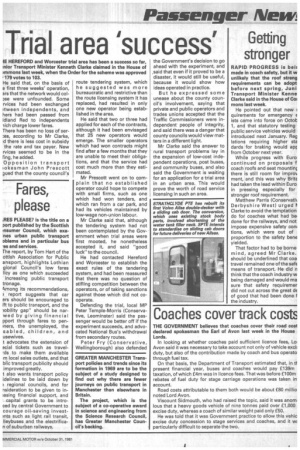Trial area 'success ' Getting
Page 13

If you've noticed an error in this article please click here to report it so we can fix it.
IE HEREFORD and Worcester trial area has been a success so far, inior Transport Minister Kenneth Clarke claimed in the House of imrnons last week, when the Order for the scheme was approved 179 votes to 103.
He said that, on the basis of first three weeks' operation, ars that the network would col)se were unfounded. Some rvices had been exchanged :tween independents, and hers had been passed from idland Red to independents nich charge lower fares.
There has been no loss of ser:es, according to Mr Clarke, d there is less cost in subsidy the rate and tax payer. New rvices seemed to be in the ring, he added.
Opposition transport lokesman John Prescott gued that the county council's route tendering system, which he suggested was more bureaucratic and restrictive than the route licensing system it has replaced, had resulted in only one new operator being established in the area.
He said that two or three had applied for each of the contracts, although it had been envisaged that 25 new operators would emerge. The smaller operators 'which had won contracts might find after a few months that they are unable to meet their obligations, and that the service had cost much more than they estimated.
Mr Prescott went on to complain that no established operator could hope to compete with small firms, such as one which had won tenders, and which ran from a car park, and had its vehicles maintained by low-wage non-union labour.
Mr Clarke said that, although the tendering system had not been contemplated by the Government when trial areas were first mooted, he nonetheless accepted it, and said "good luck" to the council.
He had contacted Hereford and Worcester to establish the exact rules of the tendering system, and had been reassured that there was no question of stifling competition between the operators, or of taking sanctions against those which did not cooperate.
Defending the trial, local MP Peter Temple-Morris (Conservative, Leominster) said the passenger would be better off if the experiment succeeds, and advocated National Bus's withdrawal from secondary routes.
Peter Fry (Conservative, Wellingborough) also defended the Government's decision to go ahead with the experiment, and said that even if it proved to be a disaster, it would still be useful, because it would show how ideas operated in practice.
But he expressed some unease about the county council's involvement, saying that private and public operators and trades unions accepted that the Traffic Commissioners were independent people of integrity, and said there was a danger that county councils would view matters in a different light.
Mr Clarke said the answer to rural transport problems lay in the expansion of low-cast independent operations, post buses, and community buses, and also said the Government is waiting for an application for a trial area in an urban area. This would prove the worth of road service licensing in such an area.










































